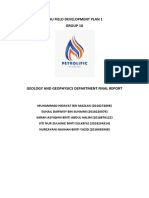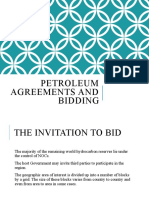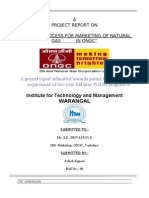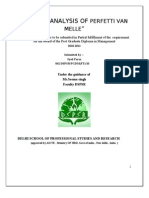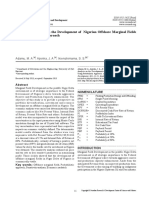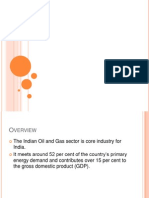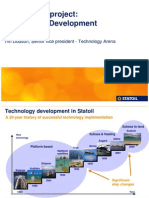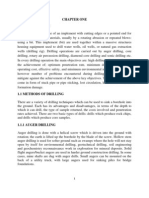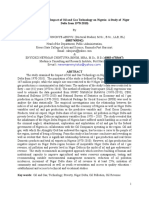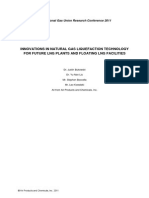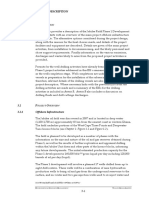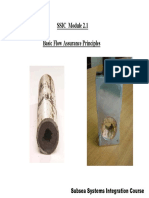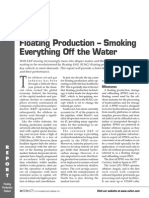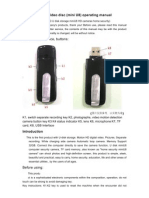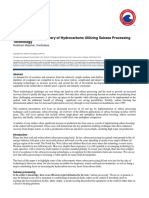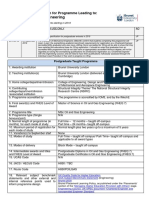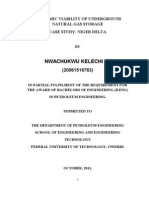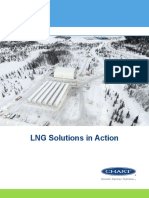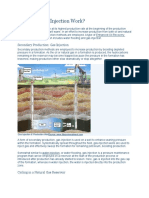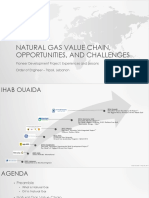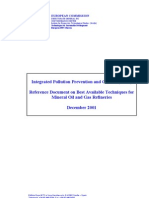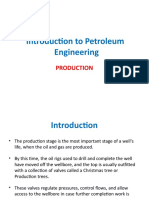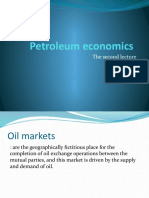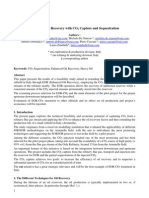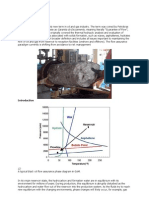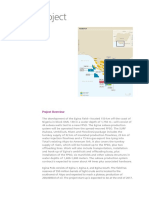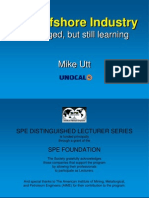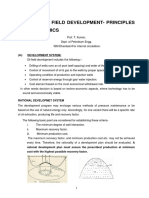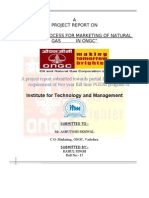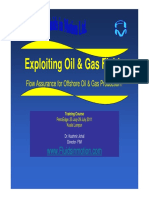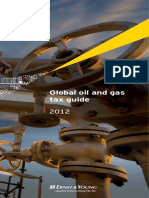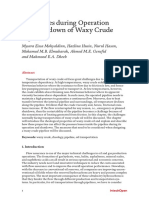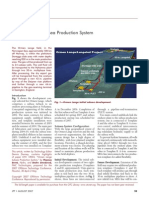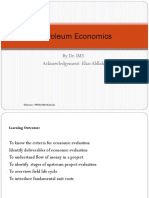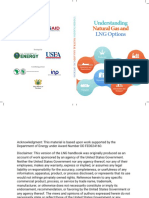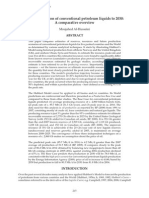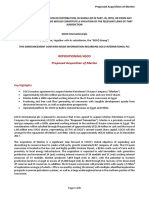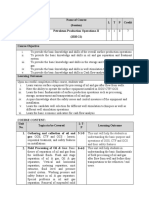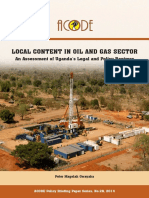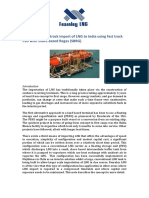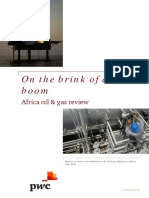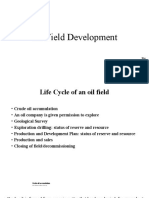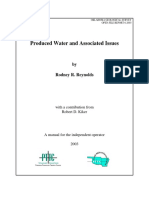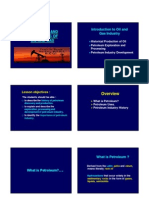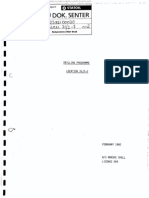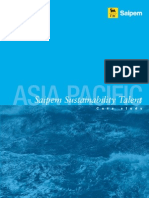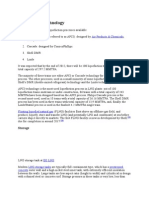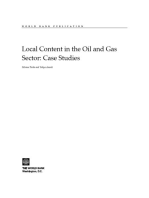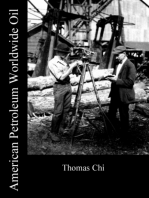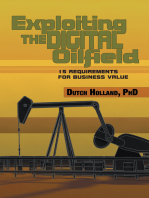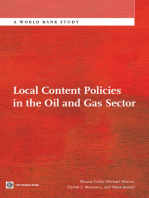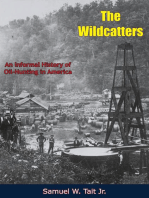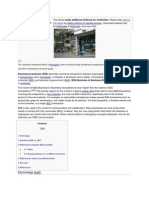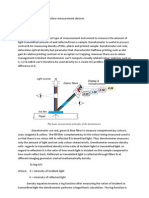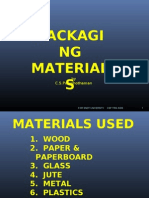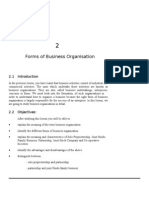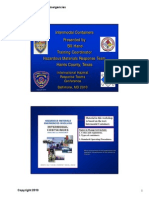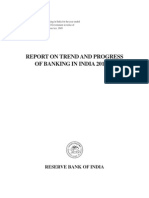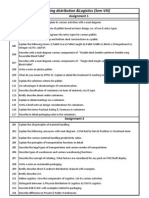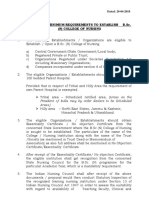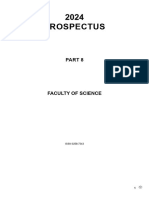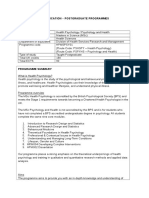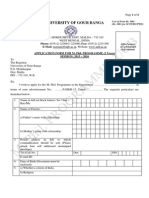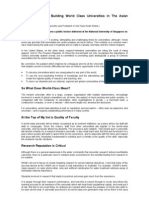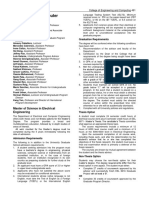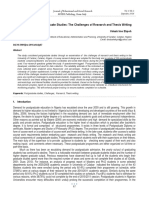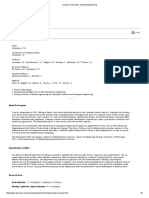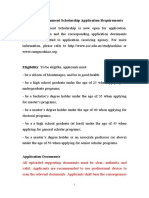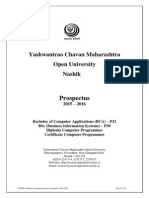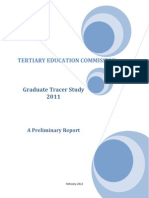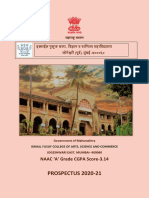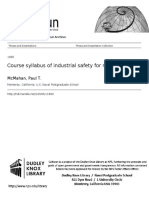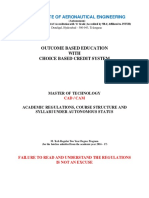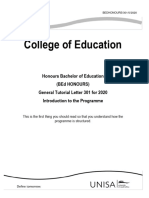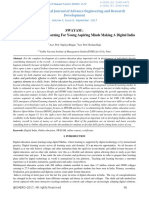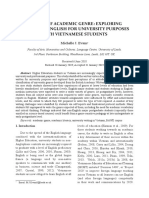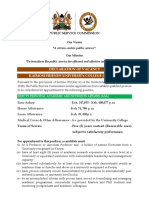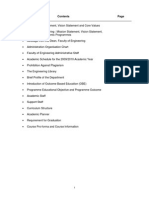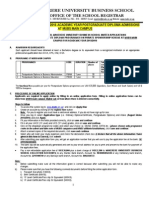Professional Documents
Culture Documents
Gow Strategy Review March 2011
Gow Strategy Review March 2011
Uploaded by
Shraddha GhagOriginal Description:
Copyright
Available Formats
Share this document
Did you find this document useful?
Is this content inappropriate?
Report this DocumentCopyright:
Available Formats
Gow Strategy Review March 2011
Gow Strategy Review March 2011
Uploaded by
Shraddha GhagCopyright:
Available Formats
THE SECOND OPINION
90% local content in Oil & Gas by 2020 (Ghanaians TAKE CHARGE of Oil & Gas Industry in 10 Years)
Ghana OIL Watch
STRATEGY REVIEW
March 2011
GHANA OIL WATCH strategy review
March 2011
TITLE:
THE SECOND OPINION:
90% local content in Oil & Gas by 2020 (Ghanaians TAKE CHARGE of Oil & Gas Industry in 10 Years)
ABSTRACT:
In February 26, 2010 the Ministry of Energy published the Local Content and Local Participation in Petroleum Activities Policy Framework to serve as a guide to achieving at least 90% local participation in all aspects of the Oil & Gas value chain by the year 2020. This research article seeks to provide implementation strategies to address the three (3) main CHALLENGES indicated by Government of Ghana in the Local Content Policy Framework [1]: 1) Human Resource Capacity Challenge, 2) Finance Challenge, and 3) Technology Challenge.
KEYWORDS:
Oil & Gas, Offshore, Onshore, Upstream, Downstream, Exploration, Development, Production, Human Resource Capacity, Finance, Technology.
AUTHOR:
Jacob Hobenu is a the founder and lead strategist for www.ghanaoilwatch.org the online education platform established to search, publish and archive public information on Ghanas oil and gas industry. He holds a B.Sc. in Agriculture from the Kwame Nkrumah University of Science and Technolgy, Kumasi and an MBA Accounting and Finance from the University of East London.
ACKNOWLEDGEMENT: I would like to acknowledge the comments and suggestions of Divine Stanley Agbola, MFin.
www.ghanaoilwatch.org
PUBLICATION
Page 2
GHANA OIL WATCH strategy review INTRODUCTION
March 2011
For decades, some aspects of the downstream petroleum business operations had been dominated by Ghanaians and indigenous companies. From Crude Oil Refinery, bulk storage, transportation of petroleum products, to retailing of products among others; Ghanaians championed these downstream Oil & Gas business operations. However the petrochemical and natural gas processing and utilisation business activities form the petroleum downstream operations that is new to indigenous companies. On the other hand the upstream petroleum industry in Ghana had been dormant over the years and was energised in recent years with the commercial discovery of the Jubilee Field in 2007. In the first quarter of 2010, the Government of Ghana released the Local Content and Local Participation in Petroleum Activities Policy Framework, with the aim of achieving full local participation in all aspects of the Oil & Gas value chain of at least 90% by 2020. This local content policy is more skewed towards addressing the challenges of the upstream petroleum industry which is new to Ghanaians and Ghanaian Companies than the downstream industry which local companies dominate. This article seeks to provide implementation strategies to address the three (3) CHALLENGES indicated by Government in the Local Content Policy Framework [1]: 1) Human Resource Capacity Challenge, 2) Finance Challenge, and 3) Technology Challenge.
HUMAN RESOURCE CAPACITY
The upstream Oil & Gas industry is NOT labour-intensive but rather technical in nature and involves specialist companies engaged in Exploration, Development and Production (ED&P) using expensive and sophisticated technology. Upstream industry professionals are usually specialist/experts in one area or another. The local content implementation strategy should focus on training Ghanaians to work in specific local institutions. These institutions include: a) GNPC (Ghana National Petroleum Corporation) the Nations Upstream Oil Company involved in Exploration, Development and Production. b) Petroleum Commission the upstream Oil & Gas industry regulator. c) Petroleum Directorate, Ministry of Energy. d) EPA (Environmental Protection Agency). e) Local Universities with Oil & Gas Faculties or running Oil & Gas Programmes.
TRAINING for GNPC, Petroleum Commission, Ministry of Energy, Public Universities, and EPA. Developing GNPC (Ghana National Petroleum Corporation) to the status of the upstream divisions of Norways Statoil or Brazils Petrobras will require training significant numbers of technical Oil & Gas professionals with Masters and PhD level education in the various specialist areas of the www.ghanaoilwatch.org PUBLICATION Page 3
GHANA OIL WATCH strategy review
March 2011
upstream industry. The Oil & Gas course table below provides some of the specialised postgraduate degree programmes required by GNPC. The Petroleum Commission, the Petroleum Directorate of the Ministry of Energy, The Environmental Protection Agency (EPA) and the public Universities offering Oil & Gas courses will also require overseas postgraduate level Oil & Gas training (in the courses listed below) for their staff. Undergraduate level Oil & Gas training should be carried out by local universities in collaboration with overseas universities with Oil & Gas faculties offering taught and research courses. These local universities require appropriate investment in teaching and research facilities in order to train toptier Oil & Gas professionals for the industry.
OIL & GAS ENGINEERING COURSES (Masters & Doctoral)
1) 2) 3) 4) 5) 6) 7) 8) 9) 10) 11) 12) 13) 14) 15) 16) Petroleum Engineering Petroleum Geology Petroleum Geophysics Petroleum Geochemistry Integrated Petroleum Geosciences Drilling & Well Engineering Oil & Gas Structural Engineering Geoscience of Subsurface Exploration Appraisal and Development Reservoir Evaluation & Management Subsea Engineering Natural Gas Engineering Natural Gas Technology Energy Resources Engineering Petrochemical Engineering Petroleum Production Engineering Mechanical and Offshore Engineering
OIL & GAS MANAGEMENT AND LAW COURSES (Masters & Doctoral)
A) B) C) D) E) F) G) H) I) J) MBA Oil & Gas Management Oil and Gas Enterprise Management International Business, Energy and Petroleum Energy Futures (Oil & Gas) Oil & Gas Project Management Oil & Gas Supply Chain Management Oil & Gas Resource Management Petroleum and Energy Economics Oil & Gas Accounting Oil & Gas Law (SPECIALISATION IN: Oil & Gas Contract Law; Reparation Law; Arbitration Law, Practice and Procedure, Environmental Aspects of Oil and Gas Law) K) Maritime Law
OIL & GAS SAFETY AND ENVIRONMENTAL SCEINCE (Masters & Doctoral)
i) ii) iii) iv) v) vi) vii) Oil & Gas Reliability Engineering Environmental Geoscience Environmental Science & Engineering Environmental Impact Assessment and Management Environmental Pollution Control Environmental and Natural Resource Economics Ecology & Natural Resource Management
www.ghanaoilwatch.org
PUBLICATION
Page 4
GHANA OIL WATCH strategy review
March 2011
WHY MASTERS (M.Sc.) AND DOCTORAL (PhD) LEVEL OVERSEAS TRAINING FOR GHANAIANS There are two fundamental ways of acquiring professional experience in any industry: 1) Either you acquire minimal formal education with several years of Industry practice, OR 2) Pursue extensive formal education (up to the Masters or PhD level) with minimal industry practice. In the case of Ghanas upstream Oil & Gas industry, policy makers believe and to a large extent have accepted that Ghanaians are new to the upstream industry and thus have minimal industry practice. The second option above serves as a quick path to raise the technical experience of Ghanaian professionals to match up to that of the expatriate staff working for the foreign oil companies. For instance, if Angus McCoss, the Exploration Director and Chief Geologist at Tullow Oil Plc, who holds a PhD in Geology, is arguing in favour of ABCD with Ghanaian Upstream professionals from the Ministry of Energy, GNPC and Petroleum Commission whose team are also PhD holders in Geology, then were talking serious discussion that will benefit Ghana. And not just the Ghanaian team nodding and saying YES SIR, YES SIR, (for the lack of technical insight in Oil & Gas matters) whiles in actual fact theyre supposed to be saying NO, NO, NO! THIS IMPLEMENTATION STRATEGY IS TOO EXPENSIVE; LETS DO IT THIS WAY INSTEAD.
FOCUS ON TRAINING MULIT-TALENTED OIL & GAS PROFESSIONALS
A simple strategy with great positive impact involves training professionals with different oil and gas specialisations at the undergraduate and postgraduate levels. Typical Example: UNDERGRADUATE (B.Sc. Degree) a) Geology POSTGRADUATE (M.Sc. / PhD Degree) A) B) C) D) Petroleum Engineering OR Drilling and Well Engineering OR Reservoir Evaluation and Management OR Geoscience of Subsurface Exploration Appraisal and Development
This strategy reduces excessive repetition of course work in the first and second degrees, and thus expand the scope of knowledge of the professional across different fields of specialisation. It also www.ghanaoilwatch.org PUBLICATION Page 5
GHANA OIL WATCH strategy review
March 2011
saves cost since one professional can effectively perform two different Oil & Gas roles within the same organisation.
FUNDING OVERSEAS OIL & GAS TRAINING FOR GHANAIANS
USD 10 million annually is adequate to train 200 Ghanaians each year in European Universities at the Master and PhD levels who will return to work in GNPC, EPA, Petroleum Commission, Ministry of Energy, Academia, among other institutions. The source of funding is addressed under FINANCE CHALLENGE. In ten (10) years starting from 2011 Ghana Government would have directly funded the training of
2,000 (two thousand) Ghanaians in Masters and PhD level Oil & Gas programmes in overseas
Universities. PROPOSED ALLOCATIONS OF OIL & GAS PROFESSIONALS (Government Funded) INSTITUTION 1) 2) 3) 4) 5) 6) NUMBER OF OIL & GAS PROFESSIONALS 1,000 500 (i.e. 100 each) 100 100 100 200 2,000
GNPC (Ghana National Petroleum Corporation): Five (5) Public Universities: Petroleum Commission: EPA (Environmental Protection Agency): Petroleum Directorate, Ministry of Energy: Other Oil & Gas Related Public Institutions: TOTAL
OTHER OIL & GAS FUNDING SOURCES FOR GHANAIANS
a) The World Bank on December 20, 2010 approved a credit of USD38 million to the Government of Ghana for implementation of an Oil and Gas Capacity Building Project which will focus on Building Capacity to Manage Ghana's Oil. b) The Russian Government and other countries are providing scholarships for Ghanaians to be trained in Oil & Gas courses in Russia and other countries. c) The upstream Oil Companies working in Ghana are providing overseas training to Ghanaians as part of the local content provisions in the respective Oil & Gas contracts. A typical example is the advanced studies and mentorship programme initiated by GNPC and supported by Tullow Ghana Ltd to train 14 employees of the Exploration and Engineering Departments of the Ghana National Petroleum Corporation (GNPC) at the postgraduate level in Universities in the United Kingdom d) Since the news of oil discovery in 2007, Individual Ghanaians started to self finance their Oil & Gas career ambitions by enrolling in Oil & Gas courses and programmes in overseas universities. All these Oil & Gas professionals put together will significantly boost the level of technical expertise in Ghanas Upstream Oil & Gas Industry to TAKE CHARGE by 2020.
www.ghanaoilwatch.org
PUBLICATION
Page 6
GHANA OIL WATCH strategy review
INTER-UNIVERSITY COLLABORATION
March 2011
Local Universities collaborating with overseas universities who run specialist Oil & Gas programmes is crucial in achieving significant numbers of properly trained Oil & Gas professionals of international standards in a very short time to feed the emerging Oil & Gas Industry. The winning strategy here is to collaborate on specific courses and programmes only. This will involve visiting scholars and professors from overseas universities coming down to teach Oil & Gas course modules at local universities. Lectures could also be delivered via video conference facilities in a virtual classroom setting. Typical inter-university collaboration in Oil & Gas include: a) University of Ghana and Imperial College, London collaborating in M.Sc. and PhD Petroleum Engineering taught and research courses at the University of Ghana Campus. b) Kwame Nkrumah University of Science & Technology (KNUST) and Heriot Watt University, Scotland collaborating in M.Sc. and PhD Drilling and Well Engineering or Reservoir Evaluation & Management taught and research courses at KNUST. c) University of Cape Coast and Robert Gordon University, Scotland collaborating in MBA Oil & Gas Management course at the University of Cape Coast. d) University of Mines and Technology, Tarkwa collaborating with Manchester University in M.Sc. & PhD Petroleum Geology, Geophysics and Geochemistry at the University of Mines and Technology campus.
Oil & Gas Training for Accountants, Bankers, Insurers, and Financial Market Regulators. These Accounting and Finance professionals and their companies usually engage Oil & Gas companies in several transactions. These professionals require specialist Oil & Gas training to perform world class analysis, valuation and other financial due diligence on Oil & Gas companies. WallStreet Prep the financial training solution provider has a self study training programme and also organises corporate training programmes in Oil & Gas Financial and Valuation Modelling. Ghanaian finance professionals should take advantage of such Oil & Gas training programmes to develop their skills in the analysis and valuation of Oil Companies. The Energy Finance Programme offered by the National Banking College is another important Oil & Gas programme for Accounting and Finance Professionals. The Petroleum Commission must lead the effort to engage global experts in the upstream Oil & Gas Industry to give speeches at seminars and workshops for industry professionals, market regulators, politicians, and other stakeholders. Oil & Gas experts from institutions such as Wood MacKenzie, International Energy Agency (IEA), Peterson Institute for International Economics, Oxford Center for the Analysis of Resource Rich Economies, Revenue Watch Institute, among others could be engaged for these regular continuous professional development exercise.
www.ghanaoilwatch.org
PUBLICATION
Page 7
GHANA OIL WATCH strategy review
TAKORADI POLYTECHNIC UNIVERSITY
March 2011
Academia and Industry form a mutual symbiosis both benefiting from the relationship and sometimes unable to survive without it. All vibrant and successful markets have this academiaindustry relationship. Silicon Valley, the enclave of technological innovation and start-up financing wouldnt have existed without Stanford University. Aberdeen and Edinburgh in Scotland are cities in close proximity to the North Sea Oil and Gas industry in the U.K., and are resident to universities with some of the best Oil & Gas degree programmes in Europe. Typical Examples include Heriot Watt University, Aberdeen University, and Robert Gordon University The state of Texas in the USA is home to Universities with specialist Oil and Gas degree programmes resulting from its closeness to the Gulf of Mexico Oil & Gas fields. Examples of such universities include Texas A&M University, University of Houston, University of Texas at Austin, etc. In very successful symbiotic relationship, proximity is the single most important variable. In the Oil & Gas industry whiles Scholarly research flow into industry from academia for growth and expansion of companies, jobs are created in industry which in turn absorb the professionals trained by the universities resulting in a vibrant and sustainable market. The current focus of Oil & Gas exploration, development and production in Ghana is concentrated in the western region (offshore Ghana). The Jubilee Field (Unit Area) started commercial production in December 2010 with 35,000 bpd increasing to 120,000 bpd within 3 to 6 months. Other fields such as the Mahogany- East (ex. Southeast Jubilee) Field, Tweneboa Field, Enyenra (ex. Owo) Field and several Oil and Gas prospects are located offshore the western region of Ghana, thus making Takoradi Polytechnic the institution of higher learning in close proximity to the western region oil fields. It will be of strategic importance to convert the Takoradi Polytechnic into TAKORADI POLYTECHNIC UNIVERSITY with focus on Oil and Gas degree programmes for undergraduate and postgraduate (Masters & PhD) studies. It will also serve as the main public university in Ghana to directly absorb graduates from Technical and Vocational Schools. Strategically, the Takoradi Polytechnic University should focus on OFFSHORE Oil & Gas degree programmes whiles the newly launched University of Energy and Natural Resources to be sited in the Brong Ahafo Region focus on ONSHORE Oil & Gas programmes. The Brong Ahafo Region is right in the middle of the Voltaian Basin which is the largest onshore sedimentary basin in Ghana with potential Oil & Gas resources and thus it makes strategic sense for the University of Energy and Natural Resources to focus on onshore Oil & Gas programmes. The benefits of proximity of TAKORADI POLYTECHNIC UNIVERSITY to western region oil fields include but not limited to the following: o o Students have access to Oil & Gas company facilities for practical lessons and tutorials. Increase possibility of Industry professionals working with Oil & Gas companies in the western region to visit the TAKORADI POLYTECHNIC UNIVERSITY as visiting scholars to lecture and give speech on specific oil and gas subjects and topics. PUBLICATION Page 8
www.ghanaoilwatch.org
GHANA OIL WATCH strategy review
o o
March 2011
Opportunity for internship and student attachments with Oil & Gas companies. Opportunity for students to see, observe and in some cases work with some of the latest technologies and equipment used by the Oil & Gas companies in the western region of Ghana, for offshore Exploration, Development and Production. The benefit of Oil & Gas companies recruiting graduates from TAKORADI POLYTECHNIC UNIVERSITY to join their teams locally and overseas.
Ghanas Licensed Offshore Oil & Gas Blocks
www.ghanaoilwatch.org
PUBLICATION
Page 9
GHANA OIL WATCH strategy review TECHNOLOGY CHALLENGE
OFFSHORE (SHALLOWWATER & DEEPWATER) EXPLORATION
March 2011
The upstream oil & gas operations involve the use of sophisticated and expensive technology for offshore activities. The efficient way to carryout offshore Exploration, Development and Production (ED&P) is to outsource some ED&P operations and services to specialist Oil & Gas service companies. GNPC doesnt need capital investments to acquire Plant and Equipments (fixed assets) for Exploration and Production of oil & gas fields. Even the super-majors such as Exxonmobil, Shell and BP engage in outsourcing some of their operations to specialised oil & gas service companies. This strategy is efficient and cost effective especially for offshore deepwater Exploration, Development and Production. It wasnt for fun that the Jubilee Partners outsourced specific aspects of the jubilee field exploration, development and production to specialist service firms. Typical examples of deepwater oil & gas operations and activities that could be outsourced by GNPC to specialist oil & gas service companies include but not limited to the following: Outsource offshore deepwater drilling to OCEAN RIG the owners of the Eirik Raude Rig which has done extensive work in the Tano Basin, or TRANSOCEAN LTD the owners of the Deepwater Millennium drillship. Outsource installation of subsea Oil & Gas transportation and control systems including pipeline systems, flowlines, risers, umbilicals, etc to TECHNIP.
Outsource subsea production, fluid control and measurement systems (Christmas trees, manifolds, etc) to FMC TECHNOLOGIES.
Outsource seismic services, formation evaluation, cementing, completion and well testing to SCHLUMBERGER.
www.ghanaoilwatch.org
PUBLICATION
Page 10
GHANA OIL WATCH strategy review
Outsource reservoir development and optimisation, and well monitoring services to BAKER HUGHES.
March 2011
In the future Ghanaian Oil & Gas professionals who have established service companies will be in the position to effectively compete with their foreign counterparts for such Oil & Gas service contracts. The non-technical Oil & Gas services such as guarding oil rigs and installations, catering, transportation, etc should be strategically reserved for Ghanaian Service Companies.
GNPC has gained tremendous deepwater experience from the exploration, development and production of the Jubilee Field and other deepwater prospects offshore Ghana. This puts GNPC in a position to be able to solely acquire a block within the next 5 years to undertake exploration, development and production of a deepwater oil and gas field the size of the Jubilee Field. Petrobras, the Brazilian Oil Company is engaged in similar offshore deepwater exploration, development and production activities. GNPC must put in place a system that makes the Nations oil exploration company a learning organisation where continuous professional development is a key component of its career development strategy. The work culture should be built around focus groups and multi-disciplinary teams working on projects, holding regular in-house workshops and seminars; assigning academic style project and research work to technical staff (with presentations and Q&A sessions), among other strategies. Engineers MUST always be in the field working and not pushing papers in offices.
ONSHORE EXPLORATION
In October 2010, the Russian government informed Ghanas Minister of Energy of its preparedness to make available to Ghana, classified documents on oil and gas reserves in the Voltaian Basin, if the government of Ghana officially applies for them. The documents containing geological findings of the basin, were prepared by geologists of the then Soviet union in the 1960s during the Presidency of Dr. Kwame Nkrumah, but were taken away after the 1966 coup detat.
www.ghanaoilwatch.org
PUBLICATION
Page 11
GHANA OIL WATCH strategy review
March 2011
The seismic survey conducted by the Russian team on the basin covered a total area of 103,600sq. km that stretches from mid-country to the northern sector, and is believed to have potential for onshore oil and gas resources [2]. This is a great starting point for GNPC to champion onshore Exploration, Development and Production (ED&P) in Ghana. Onshore (ED&P) of Oil & Gas resources is less expensive and require less advance technologies compared with offshore deepwater ED&P. Government of Ghana must as a matter of strategic importance, equip the Geological Survey Department with the latest technology to carryout 3D and 4D Seismic Survey of the onshore sedimentary basins, particularly building on the work done by the Russians in the 1960s. Since we live in a country where everything of strategic importance have to be financed by our donor partners, it wouldnt be a bad idea to include Retooling of the Geological Survey Department to undertake Oil & Gas Exploration as one of the main programmes in the 2nd Millennium Challenge Compact the US Government has hinted it will extend to Ghana. Government of Ghana through the GNPC must own 100% of all onshore Oil & Gas blocks at the exploration: seismic data acquisition and exploratory well stage. After the discovery of high probability Oil & Gas targets (reservoirs), then a farm-in programme is put in place to attract foreign Oil & Gas companies to partner GNPC in developing the onshore field. This will give Ghana an upperhand in negotiating the details of the Oil & Gas contract. GNPC controlling a minimum of 51% working interest in all onshore Oil & Gas blocks will be a good start in our quest to lift Ghana out of the doldrums of Poverty. An alternative strategy will be to sell a strategic minority stake in GNPC (say 20%) to one of the super-major oil companies with extensive experience in exploration, development and production onshore Oil & Gas fields. GNPC will then leverage on the technology and experience of the foreign oil company to solely develop and produce the onshore fields in Ghana. A typical example is BP (British Petroleum) acquiring a 30% strategic minority stake in 23 Oil & Gas blocks (production sharing contracts) operated by Reliance Industries Ltd of India, and the formation of a 50:50 joint venture between the two companies for the sourcing and marketing of gas in India. (Deal was announced on 21 February 2011) [5].
www.ghanaoilwatch.org
PUBLICATION
Page 12
GHANA OIL WATCH strategy review FINANCE CHALLENGE
March 2011
Since the days of the first man - Adam, RISK & RETURN has always been associated with investments. The higher the risk you take, the higher the return on your investment. It will be unacceptable for Government of Ghana through GNPC to remain risk averse thereby settling down for a meagre 10% carried interest in the less risky onshore Oil & Gas blocks. Tullow, Kosmos and Anadarko are smiling all the way to the bank with their astronomical return on investment returns for taking calculated risk investing in Oil & Gas blocks offshore Ghana that is currently producing the jubilee field. The cost of Exploring, Developing and Producing an onshore field in Ghana the size of the Jubilee Field (Offshore) will range between 1/20 (one-twentieth) to about 1/5 (one-fifth) the cost of developing a similar offshore deepwater Oil & Gas field like jubilee (rough estimate). The cost estimates for an onshore ED&P of an oil field depends on whether the field has a shallow or deep reservoir requiring shallow or deep wells. Cost of Oil & Gas Wells: deepwater drilling rig rates in 2010 was around $420,000/day, plus similar additional spread costs, a deep water well of duration of 100 days can cost around US$100 million. High performance jack-up rig rates in 2010 was around $150,000/day and similar service costs, a high pressure, high temperature well of duration 100 days can cost about US$30 million. Onshore wells on the other hand can be considerably cheaper, particularly if the field is at a shallow depth, where costs range from less than US$1 million to $15 million for deep and difficult wells [3] The Atwood Hunter Offshore Drilling Rig Onshore Drilling Rig
Jubilee field capital expenditure is estimated at USD 3.35 billion. Raising USD167 million to USD670 million to finance the development and production of an onshore field the size of Jubilee should not be a difficult task for the Government of Ghana. Have you considered all the benefits that come with 100% ownership of an Oil & Gas field the size of Jubilee? The billions of dollars accruing to the state for taking calculated risk in financing the development and production of our own natural resources onshore Ghana! Ghana in 2007 raised USD 750 million from the international capital market. The total bid received was in excess of USD 3 billion, a huge oversubscription. Tremendous opportunities exist for Ghana to raise the much needed capital for self-financing and profitable projects (such as onshore Oil & Gas www.ghanaoilwatch.org PUBLICATION Page 13
GHANA OIL WATCH strategy review
March 2011
exploration, development and production) from the international financial market. Tullow, Kosmos and even the super-major such as Exxonmobil, Shell, BP all raise capital on the international financial market; so why is GNPC and the government of Ghana in despair about funding Oil & Gas Exploration, Development and Production in Ghana. With the coming on stream of the 3-Tier Pension Scheme, hundreds of millions of Ghana Cedis will be available for investment in the equity and money markets. On February 16, 2011, Government of Ghana raised GH 400 million (USD 266 million) through the issue of a 3-Year Fixed Rate Bond. Total bids received from investors through the Bank of Ghanas auction process amounted to GH 753.7 million (USD 502 million), representing an oversubscription of 88% [4]. Government of Ghana must strategically extend the yield curve (term structure) of its fixed income securities to 10 years in the short to medium term. GNPC can then directly or via the Government of Ghana raise long-term capital locally by issuing 10 year bonds to finance Exploration, Development and Production of onshore Oil & Gas fields. Furthermore, several foreign investment boutiques, Private Equity firms, Hedge Funds, Sovereign Wealth Funds, etc may be interested in providing Mezzanine finance for the development and production of onshore fields in Ghana. Regarding onshore exploration, development and production of Oil & Gas resources, Ghana has NO financial challenge; we just need a little more strategising to TAKE CHARGE of the onshore Oil & Gas activities.
90% LOCAL CONTENT IN OIL & GAS BY 2020
We set an ambitious local content target for ourselves to achieve 90% local content in the oil & gas industry by 2020. Should we concede and throw away our vision because of the recommendations of some consultant. Shame to Ghana! To Kwame Nkrumahs Ghana, SHAME! Shame to us all. Who said a consultants recommendations should be Ghanas implementation strategy? Have we sought for a 2nd opinion on the implementation strategy for the 90% local content policy? It may be Ghanas most priced asset in the upstream oil & gas industry. The foreign oil companies tell us that Ghanaians dont have the upstream Oil & Gas expertise, so we should sit back and give them the licence and theyll do the Exploration, Development and Productions for Ghana. Who are we listening to? Let us stop this slavery talk that we dont have the oil & gas expertise; even if its true, nothing stops Ghana from training Oil & Gas professional now. The Kwame Nkrumah University of Science and Technology has been running degree programmes in GEOLOGY for a very long time; who says we dont have some of the oil & gas expertise?
www.ghanaoilwatch.org
PUBLICATION
Page 14
GHANA OIL WATCH strategy review CONCLUSION
March 2011
10 years starting from 2011 is more than enough to train oil & gas professionals for GNPC, The Petroleum Commission, EPA, The Ministry of Energys Petroleum Directorate and Public Universities among others. An annual budget of 10 million dollars is adequate to train at least 200 Ghanaians annually in Oil & Gas postgraduate courses MSc and PhD in European Universities. These oil & gas professionals trained overseas will return to Ghana to take up roles at GNPC, Petroleum Commission, Energy Ministry, EPA and Academia among others. Time is not on our side; the next generation may not be using hydrocarbons to power vehicles. WAKE UP OOO GHANA, WAKE UP. God Bless Our Homeland, Ghana.
REFERENCES:
[1] Local Content and Local Participation in Petroleum Activities Policy Framework; Ministry of Energy, February 26, 2010. [2] More oil in Ghana on-shore: http://www.ghanaoilwatch.org (ACCESSED: February 15, 2011; 21:00pm) [3] OIL WELL COST: http://en.wikipedia.org/wiki/Oil_well (ACCESSED: February 16, 2011; 20:00pm) [4] Ghanas 3-Year Bond Oversubscribed as Economy Attracts Investors: http://ghanaoilwatch.org (ACCESSED: February 18, 2011; 7:00am) [5] BP and Reliance announce major partnership in India: http://bp.com (ACCESSED: 25 February, 2011; 4:00am)
CONTACT AUTHOR
TEL: 0243269595 Email: Jacob.hobenu@ghanaoilwatch.org
www.ghanaoilwatch.org
PUBLICATION
Page 15
You might also like
- Rhu Field Development Plan 1 Group 10Document24 pagesRhu Field Development Plan 1 Group 10Muhammad Hidayat Bin MazlanNo ratings yet
- Petroleum Agreements and BiddingDocument12 pagesPetroleum Agreements and BiddingKaoru AmaneNo ratings yet
- A Project Report GasDocument82 pagesA Project Report GasSumit KumarNo ratings yet
- Practical-4-Cost Estimate For Printed CartonsDocument6 pagesPractical-4-Cost Estimate For Printed CartonsShraddha Ghag100% (1)
- Practical-3-Cost Estimate For Printed Job Using Gravure ProcessDocument5 pagesPractical-3-Cost Estimate For Printed Job Using Gravure ProcessShraddha Ghag100% (3)
- Market Analysis of Perfetti Van Melle PDFDocument20 pagesMarket Analysis of Perfetti Van Melle PDFAshutosh SinghNo ratings yet
- Economics Analysis On The Development of Nigerian Offshore Marginal FieldsDocument11 pagesEconomics Analysis On The Development of Nigerian Offshore Marginal FieldsJasgeoNo ratings yet
- Oil and Gas IndustryDocument23 pagesOil and Gas IndustryJoshwin JacobNo ratings yet
- Statoil Technology LNG PDFDocument15 pagesStatoil Technology LNG PDFmctimlimNo ratings yet
- Seminar WorkDocument50 pagesSeminar Workodii victor ogbonnayaNo ratings yet
- Impact of Oil and Gas Technology On Nigeria (The Niger Delta Experience) For PublicationDocument38 pagesImpact of Oil and Gas Technology On Nigeria (The Niger Delta Experience) For PublicationNewman EnyiokoNo ratings yet
- Innovations in LNG TechnologyDocument15 pagesInnovations in LNG TechnologyCraigUnderwoodNo ratings yet
- Jubilee Field Eia Chapter 3 PDFDocument97 pagesJubilee Field Eia Chapter 3 PDFSamuel Mawutor GamorNo ratings yet
- Module 2.1 - Basic Flow Assurance PDFDocument13 pagesModule 2.1 - Basic Flow Assurance PDFAyuku KidaNo ratings yet
- First Fpso by ShellDocument4 pagesFirst Fpso by ShellsnamprogNo ratings yet
- U Disk Camera (MiniU8) Operating InstructionsDocument4 pagesU Disk Camera (MiniU8) Operating InstructionsHhjohf GhjgdmNo ratings yet
- How To Increase Recovery of Hydrocarbons Utilizing Subsea Processing TechnologyDocument14 pagesHow To Increase Recovery of Hydrocarbons Utilizing Subsea Processing TechnologySara AguilarNo ratings yet
- MSC Oil and Gas EngineeringDocument8 pagesMSC Oil and Gas EngineeringAhmed Hussein100% (1)
- Bulk CargopptxDocument23 pagesBulk CargopptxRyancyrill Glodobe100% (1)
- Economic Viability of UGS in NigeriaDocument87 pagesEconomic Viability of UGS in NigeriaNwachukwu Caleb Kelechi100% (3)
- Whitepaper Marginal FieldsDocument8 pagesWhitepaper Marginal FieldsarispriyatmonoNo ratings yet
- Natural Gas Explained - LNGDocument24 pagesNatural Gas Explained - LNGMELVIN MAGBANUANo ratings yet
- How Does Gas Injection WorkDocument3 pagesHow Does Gas Injection WorkrajasekharboNo ratings yet
- Ihabouaida Naturalgas 170523071015Document33 pagesIhabouaida Naturalgas 170523071015Domingo PintoNo ratings yet
- BAT Mineral Oil and Gas RefineriesDocument516 pagesBAT Mineral Oil and Gas RefineriesalbertoperezroblesNo ratings yet
- Chapter 7 ProductionDocument35 pagesChapter 7 ProductionDeniz AkoumNo ratings yet
- Planning in Oil and Gas FieldsDocument44 pagesPlanning in Oil and Gas FieldsJairo CortesNo ratings yet
- Petroleum Economics: The Second LectureDocument7 pagesPetroleum Economics: The Second Lectureرائد رحيم كاظم100% (1)
- 231 PDFDocument20 pages231 PDFhawar abdul-khaliqNo ratings yet
- Notes On The Problems of Cargo Ventilation: World Meteorological OrganizationDocument53 pagesNotes On The Problems of Cargo Ventilation: World Meteorological OrganizationNIKHIL JASWAL100% (1)
- ZohrDocument4 pagesZohrMohamed Hassan100% (1)
- Flow AssuranceDocument7 pagesFlow AssuranceMubarik AliNo ratings yet
- EginaDocument2 pagesEginaoraywattNo ratings yet
- The Offshore IndustryDocument73 pagesThe Offshore IndustryChan Sek YeongNo ratings yet
- MySep Software Brochure PDFDocument7 pagesMySep Software Brochure PDFoverlord5555No ratings yet
- Oil and Gas Field Delopment PDFDocument97 pagesOil and Gas Field Delopment PDFManish SoniNo ratings yet
- A Project Report GasDocument81 pagesA Project Report GasRahul Singh100% (1)
- Exploiting Oil & Gas Fields - FA Training-1KJ-Day 1 PDFDocument68 pagesExploiting Oil & Gas Fields - FA Training-1KJ-Day 1 PDFRyan LiuNo ratings yet
- Africa Oil and Gas GuideDocument577 pagesAfrica Oil and Gas Guidebeyu777No ratings yet
- Challenges During Operation and Shutdown of Waxy Crude PipelinesDocument13 pagesChallenges During Operation and Shutdown of Waxy Crude PipelinesJesseNo ratings yet
- Ormen Lange Subsea Production SystemDocument3 pagesOrmen Lange Subsea Production Systemssmanian68100% (2)
- 1.1 Petroleum Economics IntroDocument17 pages1.1 Petroleum Economics IntroZafNo ratings yet
- Understanding Natural Gas and LNG Options October 11 2017 - 1Document248 pagesUnderstanding Natural Gas and LNG Options October 11 2017 - 1Tivani MphiniNo ratings yet
- Oil World Production 2030Document53 pagesOil World Production 2030Alberto NavasNo ratings yet
- Proposed Acquisition of MerlonDocument8 pagesProposed Acquisition of MerlonboringestNo ratings yet
- Oil and Gas Production ThesisDocument6 pagesOil and Gas Production Thesisjoannapaulsenelgin100% (2)
- Lecture Plan - Petroleum Production Operations-IIDocument2 pagesLecture Plan - Petroleum Production Operations-IIJatin RamboNo ratings yet
- Acode - Local ContentDocument38 pagesAcode - Local ContentTheophile MegueptchieNo ratings yet
- FSU Concept OutlineDocument4 pagesFSU Concept OutlineUJJWALNo ratings yet
- Water Oilfield HandbookDocument64 pagesWater Oilfield HandbookBilal KhashanNo ratings yet
- 2014 PWC Africa Oil & Gas ReviewDocument80 pages2014 PWC Africa Oil & Gas ReviewDebbie CollettNo ratings yet
- Oil Field DevelopmentDocument13 pagesOil Field DevelopmentBossokNo ratings yet
- Produced Water and Associated Issues: by Rodney R. ReynoldsDocument65 pagesProduced Water and Associated Issues: by Rodney R. ReynoldseugeniuciobanuNo ratings yet
- Economics and Geopolitics of Oil and GasDocument12 pagesEconomics and Geopolitics of Oil and Gasm_arrive89No ratings yet
- 70 02-31-2 7 Drilling ProgrammeDocument40 pages70 02-31-2 7 Drilling ProgrammeTorekhan AibekovNo ratings yet
- SAIPEM Oil Gas - Asia PacificDocument40 pagesSAIPEM Oil Gas - Asia PacificDennyza100% (2)
- Storage and Transportation LNGDocument5 pagesStorage and Transportation LNGSanil Kuriakose100% (1)
- Exploiting the Digital Oilfield: 15 Requirements for Business ValueFrom EverandExploiting the Digital Oilfield: 15 Requirements for Business ValueRating: 5 out of 5 stars5/5 (1)
- The Wildcatters: An Informal History of Oil-Hunting in AmericaFrom EverandThe Wildcatters: An Informal History of Oil-Hunting in AmericaNo ratings yet
- Is 7028Document1 pageIs 7028Shraddha Ghag0% (1)
- b2b b2cDocument4 pagesb2b b2cShraddha GhagNo ratings yet
- 6.density & Colour MeasurementDocument3 pages6.density & Colour MeasurementShraddha GhagNo ratings yet
- Anderson Basicppt CH 06Document54 pagesAnderson Basicppt CH 06Shraddha GhagNo ratings yet
- Packaging MaterialsDocument15 pagesPackaging MaterialsShraddha Ghag100% (1)
- SssDocument36 pagesSssPavankocherlakota KocherlakotaNo ratings yet
- WoodencontainersDocument70 pagesWoodencontainersShraddha GhagNo ratings yet
- Paper BoardsDocument16 pagesPaper BoardsAditi DesaiNo ratings yet
- Haz10 Spkr305A B ImContainersWorkshop Hand BillDocument55 pagesHaz10 Spkr305A B ImContainersWorkshop Hand BillShraddha GhagNo ratings yet
- Effective Time Management: Prof J Philip President XIMEDocument39 pagesEffective Time Management: Prof J Philip President XIMEShraddha GhagNo ratings yet
- Debt Issue of Tata Coffee LTD: Mib AssignmentDocument2 pagesDebt Issue of Tata Coffee LTD: Mib AssignmentShraddha GhagNo ratings yet
- Report On Trend and Progress of Banking in India 2010-11Document215 pagesReport On Trend and Progress of Banking in India 2010-11Shraddha GhagNo ratings yet
- General Banking NewsDocument14 pagesGeneral Banking NewsShraddha GhagNo ratings yet
- Word File For ObservationDocument1 pageWord File For ObservationShraddha GhagNo ratings yet
- Business LineDocument23 pagesBusiness LineShraddha GhagNo ratings yet
- Packaging Distribution &logistics (Sem VIII) : Assignment 1Document2 pagesPackaging Distribution &logistics (Sem VIII) : Assignment 1Shraddha GhagNo ratings yet
- Cbe News FinalDocument32 pagesCbe News FinalShraddha GhagNo ratings yet
- Guidelines For Nursing PDFDocument15 pagesGuidelines For Nursing PDFPratik MukulNo ratings yet
- The Degree Is Not Enough PDFDocument14 pagesThe Degree Is Not Enough PDFMandla NdlovuNo ratings yet
- Science 2024Document315 pagesScience 2024ndouajax2010No ratings yet
- MSGuideDocument18 pagesMSGuideMahesh ChandrappaNo ratings yet
- City University of London Pshspy Pspyhs Health Psychology Psychology and HealthDocument11 pagesCity University of London Pshspy Pspyhs Health Psychology Psychology and HealthRodrigo MartinezNo ratings yet
- M Phil Applicatin-Form Ugb 2015 WebDocument4 pagesM Phil Applicatin-Form Ugb 2015 Webbapai1986No ratings yet
- PGR Application Form FinalDocument16 pagesPGR Application Form FinalRahul YadavNo ratings yet
- The Challenge of Building World Class Universities in The Asian RegionDocument4 pagesThe Challenge of Building World Class Universities in The Asian RegionFaris AhmadNo ratings yet
- Electrical and Computer Engineering CatalogDocument9 pagesElectrical and Computer Engineering CatalogNadisanka RupasingheNo ratings yet
- Mzu Brochure NewDocument12 pagesMzu Brochure NewVaasulu MSNo ratings yet
- Postgraduate Studies: The Challenges of Research and Thesis WritingDocument8 pagesPostgraduate Studies: The Challenges of Research and Thesis WritingHarvagale BlakeNo ratings yet
- Queen's University - Mining EngineeringDocument3 pagesQueen's University - Mining EngineeringNitinkiet103No ratings yet
- Chinese Government Scholarship Application Requirements PDFDocument3 pagesChinese Government Scholarship Application Requirements PDFMirela CobicNo ratings yet
- Bca Prospectus 2015 2016Document44 pagesBca Prospectus 2015 2016api-281634770No ratings yet
- PostgraduateDocument5 pagesPostgraduateMichael T BelloNo ratings yet
- Tracer StudyDocument39 pagesTracer StudyMarie Aizelle Pacer Borja50% (2)
- PROSPECTUS 2020-21: NAAC A' Grade CGPA Score-3.14Document50 pagesPROSPECTUS 2020-21: NAAC A' Grade CGPA Score-3.14Chirag SolankiNo ratings yet
- Engineering IT and Computer Sciences 2019 PDFDocument299 pagesEngineering IT and Computer Sciences 2019 PDFHaris RiazNo ratings yet
- Course Syllabus of Industrial Safety For Management.: Mcmahan, Paul TDocument86 pagesCourse Syllabus of Industrial Safety For Management.: Mcmahan, Paul TKARMAVEERNo ratings yet
- World Education - Lesson 2Document22 pagesWorld Education - Lesson 2Amira AnwarNo ratings yet
- M.tech CadcamDocument102 pagesM.tech CadcamsatNo ratings yet
- Bedhons TL 301 2020Document20 pagesBedhons TL 301 2020boultontameraNo ratings yet
- SWAYAM - Study Webs OfActive-Learning For Young Aspiring Minds Making A Digital India-IJAERDV04I0957569 PDFDocument8 pagesSWAYAM - Study Webs OfActive-Learning For Young Aspiring Minds Making A Digital India-IJAERDV04I0957569 PDFbhagatsupriyaNo ratings yet
- Exam HandbookDocument16 pagesExam HandbookParveshNo ratings yet
- A Study of Academic Genre: Exploring Writing in English For University Purposes With Vietnamese StudentsDocument16 pagesA Study of Academic Genre: Exploring Writing in English For University Purposes With Vietnamese StudentsMai Anh PhanNo ratings yet
- Advert Kaimosi Friends University College PDFDocument3 pagesAdvert Kaimosi Friends University College PDFsharif sayyid al mahdalyNo ratings yet
- 2010 BachelorofEngineeringChemicalDocument267 pages2010 BachelorofEngineeringChemicalSapitri JanuariyansahNo ratings yet
- MUBS Postgraduate Diploma Courses For 2015/2016 Academic YearDocument2 pagesMUBS Postgraduate Diploma Courses For 2015/2016 Academic YearThe Campus TimesNo ratings yet
- NEW Zealand: New Ideas. Experience. Adventure Your Study GuideDocument8 pagesNEW Zealand: New Ideas. Experience. Adventure Your Study GuideWorld Wide CollegeNo ratings yet
